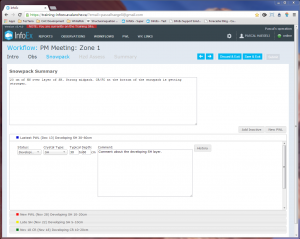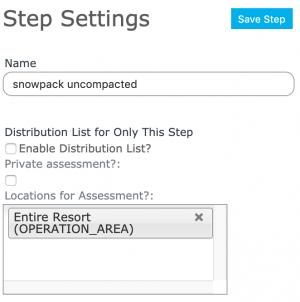Difference between revisions of "Snowpack module"
(→Layout) |
|||
| Line 22: | Line 22: | ||
==Layout== | ==Layout== | ||
| − | [[File:SnowpackModule.png|300px|thumb|right|Fig. 1: Snowpack workflow module general description of snowpack structure and list of PWLs in bottom half of screen.]] | + | [[File:SnowpackModule.png|300px|thumb|right|Fig. 1: Snowpack workflow module general description of snowpack structure and list of PWLs in bottom half of screen.]] The snowpack module consists of: |
| + | * A free-form text field for the general description of the local snowpack structure | ||
| + | * A list of PWLs that is sorted the same way as in the snowpack from younger layers at the top to older layers at the bottom. | ||
| + | Click on the PWLs labels to open its data fields. | ||
| + | |||
| + | To add a new PWL, click on the | ||
==Settings== | ==Settings== | ||
Revision as of 18:21, 27 December 2013
| REQUIREMENTS | |
| Permission | Operation administrator and higher |
| Connectivity | Online and partial offline |
This document describes the functionality of the 'snowpack' workflow module and how to properly configure if for a workflow.
Functionality
Including the snowpack module in a workflow template allows you to keep track of the general snowpack structure and the condition of persistent weak layers (PWLs) for the location that is associated with your workflow. The intent of the snowpack workflow module is to provide an electronic equivalent of the generalized snow profile that many avalanche safety operations draw on a whiteboard in their office.
| NOTE | Please note that the snowpack description entered in the Snowpack module is different from the Snowpack observations entered via the Observations module or the 'OBSERVATIONS' menu, which is intended for actual snow profile observations. |
The data entry fields of this workflow module are automatically pre-populated with the last snowpack and PWL information that was submitted to the InfoEx for the location(s) associated with the workflow.
| NOTE | If you have multiple workflows for a location (e.g., AM and PM meetings), the information is pre-populated from the last time you submitted any workflow for the location. For example, in a regular rotation, the snowpack step in the PM meeting is pre-populated with information from the AM meeting and the next AM meeting is pre-populated with information from the PM meeting of the previous day. |
You can only have a single Snowpack module steps in a workflow template.
Any workflow template with a snowpack module step will automatically have a Context module step added at the beginning of the workflow.
Any workflow template with a Snowpack module step will automatically have a Workflow summary step added at the end of the workflow. This summary allows users to review their observations and assessments before they are submitted to the InfoEx.
The snowpack description and PWL assessments submitted to the InfoEx via the Snowpack module are associated with the location specified in the entry form of the individual observation. The information entered in this workflow step is shared in the 'Snowpack Description' and 'Persistent Weak Layers' tables in the InfoEx report.
It is possible to enter the snowpack description and PWL information in the workflow module without internet connectivity.
Layout
The snowpack module consists of:
- A free-form text field for the general description of the local snowpack structure
- A list of PWLs that is sorted the same way as in the snowpack from younger layers at the top to older layers at the bottom.
Click on the PWLs labels to open its data fields.
To add a new PWL, click on the
Settings
The snowpack workflow module has the following settings (Fig. 3):
- Name
Name of the workflow step shown in the header of the workflow. It is recommended that you choose a short name (e.g., 'Ldg Wx' instead of 'Lodge Weather') to keep the navigation bar of the workflow as tidy as possible.
Other workflow modules
- Modules for entering data that is shared among InfoEx subscribers
- Modules for entering proprietary data
- Free form module
- Run list module (additional subscription required)
- Avalanche control module (additional subscription required)
- Modules for viewing information
- Other modules
Functionality tested by
- Dec. 24, 2013: Pascal Haegeli

